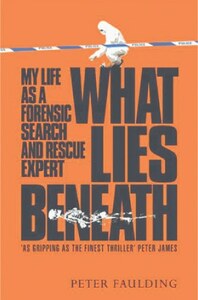What Lies Beneath: My Life as a Forensic Search and Rescue Expert
By Peter Faulding
Macmillan UK
ISBN: 9781035005901
304pp.
His name is Peter Faulding, and he finds things — things such as dead bodies, discarded remains, unmarked graves, and clues to actual crimes that were left unsolved for one reason or another. Since most of his work is related to the dead instead of the living, he isn’t that well-known across the globe. But in his home country, Britain, he is nothing short of a messiah.
A messiah for those parents who have no clue whether their ‘lost’ child is dead or alive; a messiah for overzealous protestors who themselves need protection; a messiah for those who have no hope in the normal emergency services.
In his interesting memoir, What Lies Beneath: My Life as a Forensic Search and Rescue Expert, Faulding takes you on a trip where he explains what he does for a living and unearths stuff in a manner that you usually only see in films, on TV shows or on the news.
From cold cases and serial killers to the unusual circumstances in which a British spy was found dead in his home, Faulding has managed to help local authorities find the real killer or, in some cases, provided them with evidence that others were unable to provide.
A forensic search and rescue expert takes readers through his day-to-day work experiences and his life
With the help of advanced technology that he bought from the United States and took to the United Kingdom, he was able to conduct experiments that went on to establish his name in the rescue business.
Think of Faulding as the main lead of a rescue-centric TV show such as Chicago Fire, 911 or Station 19, where he has to lead a team of experts to answer calls 24/7, regardless of how it might affect his family life or that of his colleagues. In this book, he explains everything about his job in such a way that it will interest everyone, considering that his kind of rescue services are in their infancy in Pakistan.
What makes Faulding an authority on the subject is the fact that he and his team have been at the centre of most high-profile cases that have taken place in the UK since 1995. Even though it took him some time to establish himself as someone reliable, he has been there and done that when it comes to crimes committed on land, mishaps leading to death in water or incidents that took place in both places.
Before going into the details of how he went on to become the world’s leading forensic search expert, the author talks about the why and credits his parents for introducing him to tunnels at a young age. It was, in his opinion, the one decision that shaped his life and pushed him towards a journey that he is still on after nearly three decades, while bringing closure to those who have no one else to turn to in their hour of need.
This book takes you from the time Faulding was introduced to underground tunnels by his parents, which left him fascinated with the underground world. He explains that little did he know at the time that he would spend hours and days underground in the coming years and would end up as the CEO of Specialist Group International (SGI), a leading company in Britain when it came to search and rescue.
His narration would be nothing without the mention of his 007-ish adventures, which are both good to read and imagine at the same time. He talks about the death of MI6 worker Gareth Williams, who was mysteriously found dead in a locked-room. He also provides details that led to the capture of Scottish serial killer Peter Tobin, as well as other cases where accidents resulted in someone’s death. How his insights into the Nicola Payne case and the Helen McCourt murder were able to steer the investigators in the right direction is something he explains using all his emotions perfectly.
And this is his biggest asset as an author — engaging readers’ emotions. His ability to make the incident relatable, no matter what he talks about, is something only fiction writers can pull off. Be it rescuing a protestor from a potentially harmful space or explaining to a bereaved family about their child’s demise, he takes the readers along in a way that most amateur writers are not able to. Even the chapters about his military training stint are made interesting because he knows exactly what the readers want to know, and what would keep them glued to the book.
Yes, for some readers in this part of the world, ensuring the safety of protestors might seem something unheard of but, in civilised countries, even those staging a protest have rights and that’s why the authorities engage experts such as Faulding so that they can help them resolve the issue with their wits rather than force. It is during these protests that Faulding gets to meet the infamous environmental activist ‘Swampy’ who once spent a week underground in a network of artificial tunnels dug to protest the expansion of a major expressway. Faulding befriended and formed a special bond with Swampy, despite being in the employ of authorities tasked with stopping him.
The writer’s journey might take him from dangerous tunnels to protest sites, but nothing matches the temptation of being there on the right side of history, be it in catching a serial killer or unearthing the bones of those who were considered lost, kidnapped or dead but without a final resting place.
His exploits with the machinery he and his team use will give you CSI vibes, but also make you realise that crime hardly ever pays, and no matter how smart the criminal might think of himself, there is someone out there who is smarter.
Faulding takes a lot of time in this book to talk about protests, which may bore readers by the time they reach the second half. However, when he starts to explain the reasons that made him switch from just being a confined space rescue team expert to one who was dependable enough for a forensic search, the boredom is left behind. The author explains that this decision not only helped him pay the bills, but also made him a necessity for law enforcement agencies across the country, considering the public sector was closing down such services.
Not only does he tell his readers that it is never too late to rediscover yourself, he also warns them that following your passion might not result in domestic bliss. His X profile may suggest that he is a proud father of three girls, but he explains in these pages how his work damaged his marriage, and why he was unable to see the cracks in his domestic life.
He blames himself rather than his ex-wife for the divorce and rationalises it by claiming that he had to pay the price for spending many days away from home to either assist authorities or to expand his skill set as a confined space rescue and forensic search specialist.
What turned Faulding from a youngster in love with tunnels into becoming a highly regarded and highly skilled search specialist is exactly what this book teaches us. The author helps the readers understand that, ultimately, society needs obsessive people like him.
The reviewer is a broadcast journalist who also writes on sports, film, television and popular culture.







